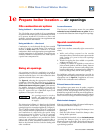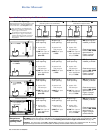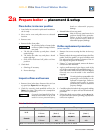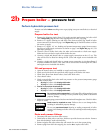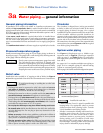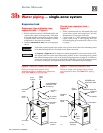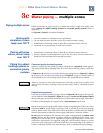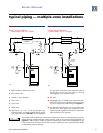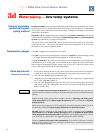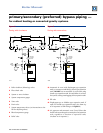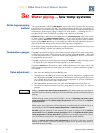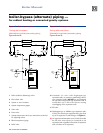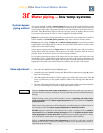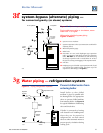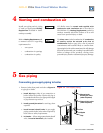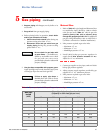
Part number 550-110-260/0200
18
GOLD CGs Gas-Fired Water Boiler
1. Set the valves while the system is cool, setting for the coldest expected water temperature
(usually 60 °F since the system will often drop to room temperature between cycles).
2. Start with valve 7a fully closed and 7b fully open.
3. Gradually open valve 7a while closing valve 7b until the temperature at gauge 8 reads
130 °F when gauge 4a reads 60 °F.
4. Note that valve
7a regulates the amount of hot water from the boiler supply which mixes
with return water. Valve 7b regulates the amount of system water flowing through the
boiler secondary loop.
Valve adjustment
(Figure 12 and 13 only)
Water piping — low temp systems3d
Primary/secondary bypass piping is preferred because the flow rate and temperature drop in
the heating circuit(s) is determined only by the heating circuit circulator(s). So adjustment
of the bypass valves in the boiler circuit will not cause a change in the heating circuit rate and
temperature distribution.
Figures 8 and 9 show suggested bypass arrangements using primary/secondary bypass piping
(preferred) for low temperature systems such as radiant heating systems or converted gravity
systems
. For alternatives, see pages 20 through 23.
The bypass valves (items
7a and 7b) provide mixing of hot boiler outlet water with cooler
system return water — set to assure a minimum return water temperature (at least 130 °F) to
the boiler. Set the valves as explained below.
Primary/secondary
(preferred) bypass
piping method
Temperature gauges
Gauge 4a is suggested, but optional on any system.
Gauge
4b is optional on converted gravity systems, but required on radiant heating systems
— to display the water temperature being supplied to the radiant tubing.
Gauge
8 is required on all systems to assure the return water temperature is accurately set for
a minimum of 130 °F. If this gauge is not available however, adjust the valves such that the
boiler-mounted temperature/pressure gauge reads at least 150 °F when the system return
water is cold (approximately 60 °F water temperature).
Failure to prevent low return water temperature to the boiler could cause corrosion of
the boiler sections or burners, resulting in severe personal injury, death or substantial property
damage.
Radiant heating system piping should include a means of regulating the boiler return
water temperature
and the system supply temperature (such as provided by an injection
pumping control
).
Boiler return water temperature will be adequately controlled using the methods shown in
this manual provided the
system supply temperature is relatively constant.
DO NOT apply the methods of this manual if the system is equipped with an outdoor
reset control
. Instead, provide controls and piping which can regulate the boiler return
water temperature at no less than 130 °F
regardless of system supply temperature. Contact
your Weil-McLain representative for suggested piping and control methods.
Failure to prevent cold return water temperature to the boiler could cause corrosion
damage to the sections or burners, resulting in possible severe personal injury, death or
substantial property damage.



